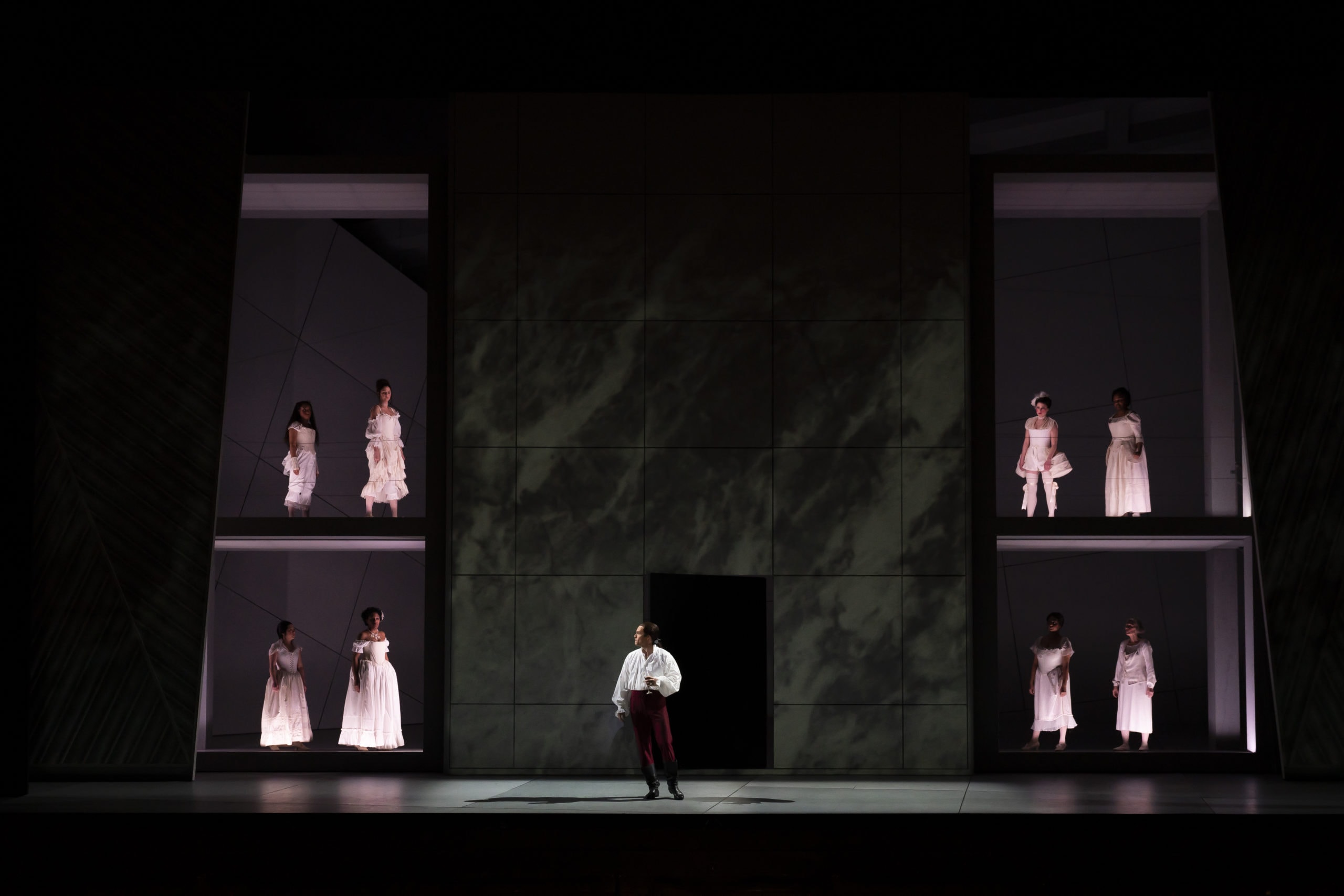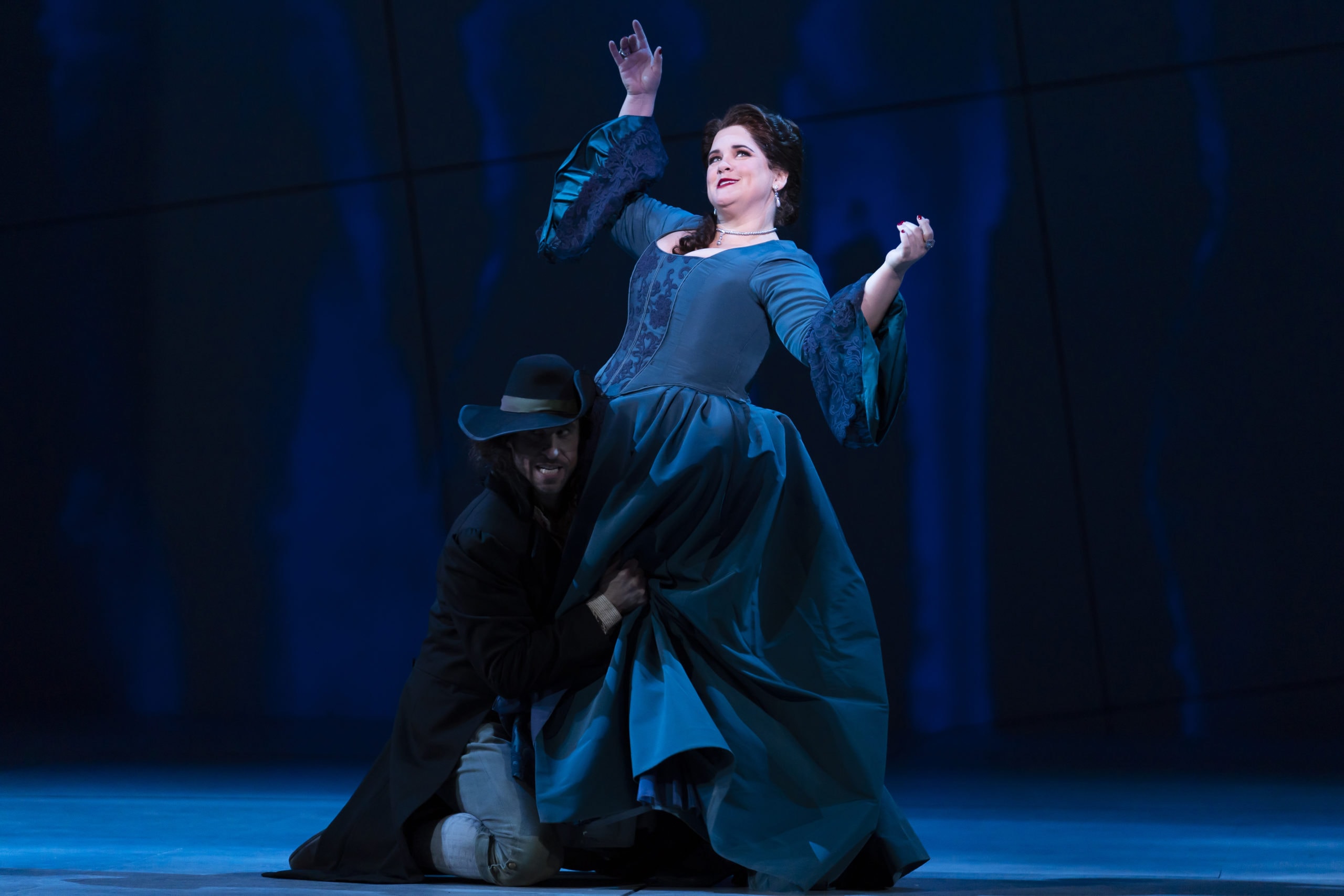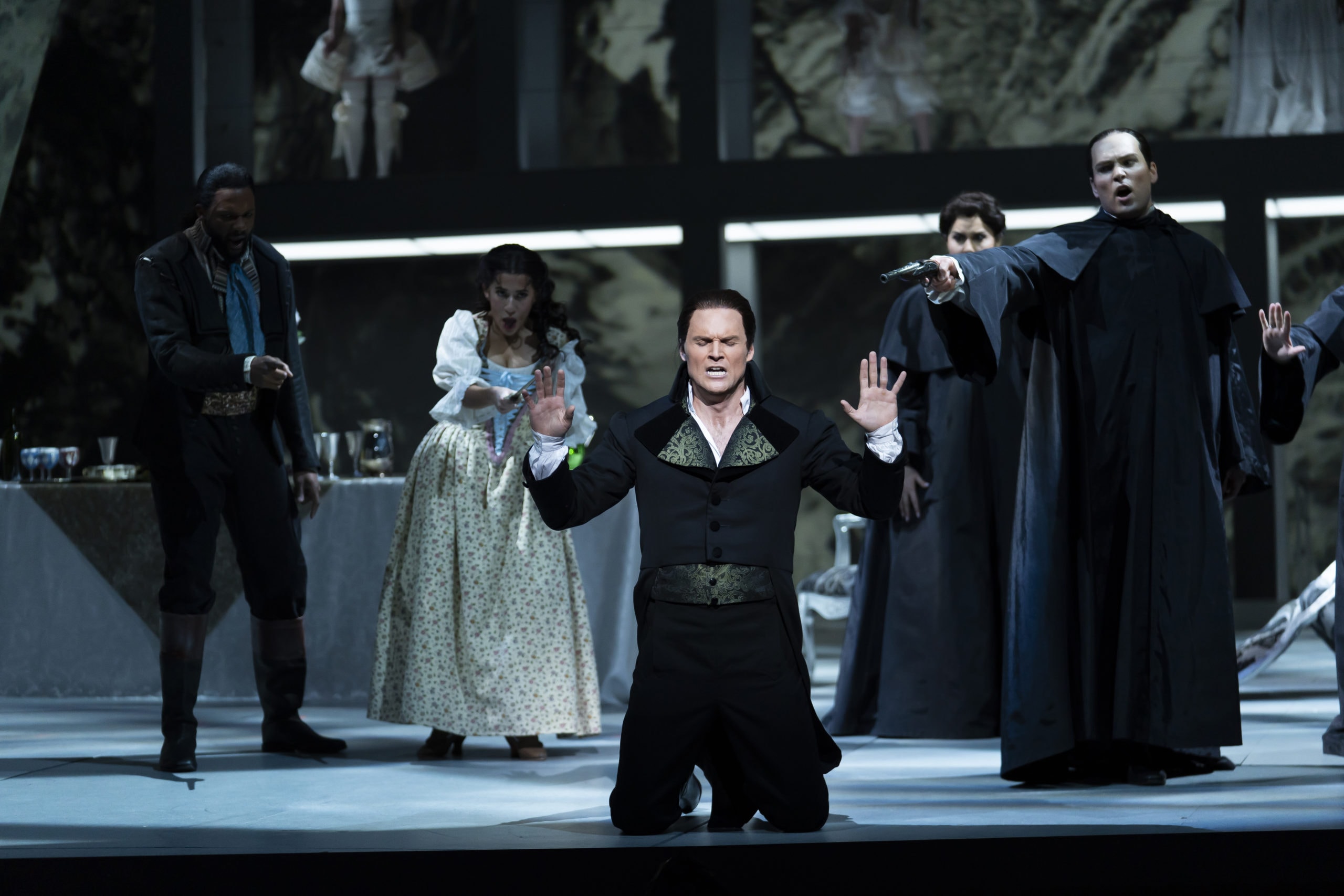The Washington National Opera’s current production of Mozart’s Don Giovanni confirms two important ideas. The first is that while opera is most effective when it entertains, its intrinsic value is cultural. The second is that Washington can and should lead the nation not just in politics, but in producing art that moves the collective, since, to roughly quote Lin-Manuel Miranda, politicians fail at empathy.

While Lorenzo da Ponte’s libretto certainly offers plenty of opportunity to go full tilt on the #MeToo movement messaging, in her directorial debut with the WNO, E. Loren Meeker’s less-is-more approach was the right one, letting the score do the work of depicting the searing pain caused by the serial rapist and murderer Giovanni, while relying on set and stage design to place in stark relief the work’s larger thematic treatment of pure evil.
That’s not to say Meeker ignores Giovanni’s female victims’ suffering. It is what we are presented with from the moment the show opens on Erhard Rom’s minimalist two-story set that frames women of many shapes, ages, and colors, standing expressionless, dressed all in white. The women haunt their respective spaces, gazing out to nowhere, disconnected from one another. I was reminded of the sad and vacant-looking faces of the prostitutes I once saw as they stood stuffed into their glass boxes in Amsterdam’s Red Light District.
Rom’s sliding monolithic, monochromatic walls of gray and white were reminiscent of just about any modern art museum anywhere. The juxtaposition with Jean-Pierre Ponnelle’s richly hued period costumes underscored the agelessness of evil: We will always need art to remind us of our relationships to it. Occasionally I found Rom’s backlit animation within the walls confusing – was that shifting shape a spirit, a flame, or an angiogram? However, Robert Wierzel’s lighting as it subtly shifted from cool to warm tones throughout effectively captured the emotional fluidity of the characters.
Such subtle stage design, in sum, afforded me the space to be present with the simmering rage and feelings of helplessness I and so many others have been experiencing of late.
And therein lies the show’s cultural value: it heals while it teaches.
I have reviewed two versions of this story recently, including GALA Theatre’s excellent Don Juan Tenorio, and in both cases, while each version pivots on a tender woman wishing to redeem the evildoer, each woman ultimately must accept that evil just is. It can change us, but mere mortals cannot change it. If we don’t see it for what it is, it will destroy us. Both shows are timeless reminders that religion can seek to redeem evil, and science may seek to pathologize and treat it as narcissism, but to dismantle evil is like undoing the forces of night and day.

Which brings us to the show’s pivotal moment, sung by Cafritz Young Artist program alumna, American soprano Keri Alkema. Her lyric and dramatic qualities made my heart race during her flat-out fantastic delivery of “Mi tradi quell’alma ingrata.” It is the moment Elvira – and the audience, if we’re paying attention – comes to terms with how evil excites and pleases us, maybe even serves our own furtive aims. It was an alchemical moment where emotion, music, and visual cues viscerally accelerated the momentum toward the coming destruction of Giovanni, sung with an assured but reptilian coolness by American bass-baritone Ryan McKinny.
Once we are honest with ourselves about our secret fascination with evil, it’s all about overcoming it and then getting ourselves and others the hell out of harm’s way, never mind redeeming the evil one. For some, like Elvira, this can be all the more difficult if we detect the longing behind the evil. Although sung to Elvira’s maid, Giovanni’s canzonetta, sung tenderly by McKinny, stirs pity with its dynamic mix of triumph and sadness.
As for whether this production is entertaining, it is. In his first fully staged production with the company, WNO principal conductor Evan Rogister’s easy give and take with his musicians, including the singers, evidenced the kind of trust essential to any tight band where the players collaborate by feel as much or more than by counting, although the tempi were perfect.
Every voice in this cast is outstanding either solo or blended with others, and complemented the colors of one another so well, the vocal tapestry was complete. Making her arresting WNO debut in the role of Donna Anna, Colombian-American spinto soprano Vanessa Vasquez’s flutey top edged ever higher than you thought it might in her revenge aria, “Or sai chi l’onore,” glinting and glimmering throughout. Let’s hear more from her, please.

American lyric tenor Alek Shrader as Don Ottavio had the lightest of all the voices, making him the perfect foil to all that booming from the lower voiced males, and perfectly embodying Mozart’s intention for Anna’s suitor to be gentle and steadfast, even when scared. I enjoyed every sweet note he sang, even if on occasion he was less audible than his counterparts. Paired with Vasquez, I believed in the sound of their love.
Also making her WNO debut as Zerlina was soprano Vanessa Becerra, whose ideal soubrette lent its unfailingly bright, coy, and lithe sound to her charming stage presence. She and fellow Texan, baritone Norman Garrett as Masetto, were well-matched in their lyrical abilities.
Completing the testosterone trio were American bass-baritone Kyle Ketelsen as Leporello and American bass Peter Volpe as The Commendatore. It was an intriguing mix of bass clef tones, with Volpe’s lyric bass bookending the night with his initial God-like thunder, promising that he alone would be the one to settle the score with the contemptible Giovanni, returning as an inferno near the end to make good on his promise. In between was Ketelsen’s beautiful range, adding nuance to the neuroticism of the servant who wishes he did not have to be in league with his bullying master.
This opera, which I have seen, sung, and listened to more times than I can count ordinarily makes me laugh, being that it is perhaps Mozart’s best “dramedy,” a show about the darkest of souls, peppered with Leperello’s snickering asides and Giovanni’s randy banter. But, after the past four years, no. No way. When Leporello sings his catalogue aria, enumerating the countless women assaulted by Giovanni, and repeats how “la piccina,” the youngest ones, are his master’s favorite to assault, in light of the Jeffrey Epstein scandal, I had chills, not giggles. To Ketelsen’s credit, he sang the entire aria not with derision, as is often done, but with remorse.
This is the real “ripped from the headlines” impact of WNO’s production of Mozart’s masterpiece. It demonstrates how as the seat of our nation’s power, and thus ground zero for the forces of good and evil, when our politicians can’t or won’t have the kind of reckoning with themselves that Elvira manages, it is Washington’s wealth of art and artists that offer moral clarity. To not leverage this wealth is to go to hell with the evildoers.
Don Giovanni runs through March 22, 2020, in the Kennedy Center Opera House, 2700 F Street NW, Washington, DC. For tickets, call the box office at (202) 467-4600, or go online.




